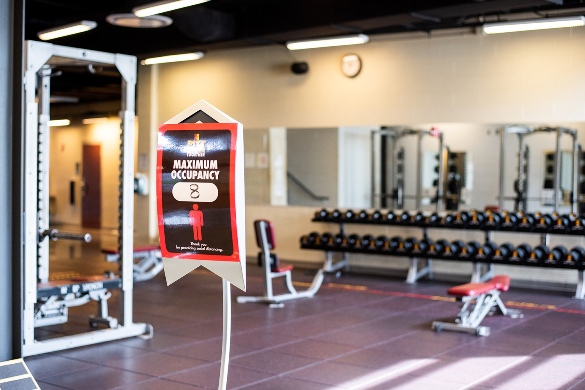Pittsburg State adapting non-academic programs for safety

Officials at Pittsburg State University are working to ensure the campus is able to reopen and stay open amid the COVID-19 pandemic.
Vice President for Student Life Steve Erwin says decisions are being based on recommended best practices. Those practices are at the core of the university’s “Student Guide for Returning to Campus.”
“A college campus is dynamic — a community of 6,000 or 7,000 people on a 10-square block area,” Erwin said. “The pandemic has been ever-changing from week to week and in some cases, day to day, but we realized that at some point we just needed to stop asking questions and get busy proposing solutions.”
Student Recreation Center
Vince Daino, director of the Student Recreation Center, and his staff have spent the last few weeks spreading recreation equipment out across the facility, which is open to students as well as faculty and staff, so that each piece is distanced.
“We have every piece of cardio and strength equipment at six feet or more now, with overflow going into Gym C,” Daino said. “Some schools took every other machine offline and put plastic bags over them, but we wanted to our students to be able to use all we have.”
Staff installed plexiglass sneeze barriers at points of contact, and the front desk will use contactless access: students swipe their own cards or use the Pitt State mobile app that’s equipped with a code reader.
Fitness classes will be offered at reduced capacity, from a typical enrollment of 36 down to 14; volleyball teams will be four players instead of six; and higher-contact team intramurals such as basketball, football, and soccer have been eliminated.
“We’ll be doing hyper cleaning and promoting that people are to wipe down what they use before and after,” Daino said.
University Housing
University Housing, under the direction of Connie Malle, made adjustments to the room assignment process, including offering additional single rooms to those who requested one, which numbered about 50.
The university has separated the check-in process from the move-in process: check-in will be done at the Bicknell Family Center for the Arts, where the large lobby provides distancing and there are clear pathways coming and going.
Students were asked to sign up for specific times, were asked to bring only one or two people to help them move, and an additional day was added to the schedule. Staff will be doubling down on cleaning, and Malle’s office is considering protocols for the eventuality that a student living in housing tests positive.
Bicknell Center
The Bicknell Center gave virtual concerts a test run this summer with its Pittsburg Virtual Festival of the Arts series — a strategy that can be used this fall by performance-based academic programs such as music and theater, should the need arise.
Technical Director Jonathan Eastman and Director Joe Firman recorded socially distanced performers using a complex camera system and they have been editing and streaming those concerts for public viewing. Staff also have prepared for a less clustered approach for future performances on the stage and social distancing for future audiences, with spacing between seats and rows and reduced capacity.
Student Center
It’s crucial for students to have not just a sense of normalcy through programs, events, and activities centered around the non-academic side of university life, but also to have leadership and skill-building experiences doing those things, says Eva Sager, associate director of the Campus Activities Center in the Student Center.
She and her staff, who direct many facets of student programming, have worked with student leaders and advisors this summer to re-imagine what that programming can look like during a time of social distancing.
“We’re trying to help them find a path through how they’ll have some normalcy with their meetings, their activities, and their events,” Sager said. They worked with Heather Eckstein in Student Success to survey incoming and returning students to gauge interest, their access to technology and wi-fi, and received 563 responses.
The Gorilla Activities Board has created a hybrid model for programming, says Program Coordinator Mary Mercer; activities will be held in person at a reduced capacity and streamed to social media to engage at-home audiences. In some cases, supplies such as crafts will be available for students to pick up in advance and use at home in tandem with the virtual programs.
Panhellenic sorority recruitment has been shortened and will observe social distancing, says Program Coordinator Anna Stark.



